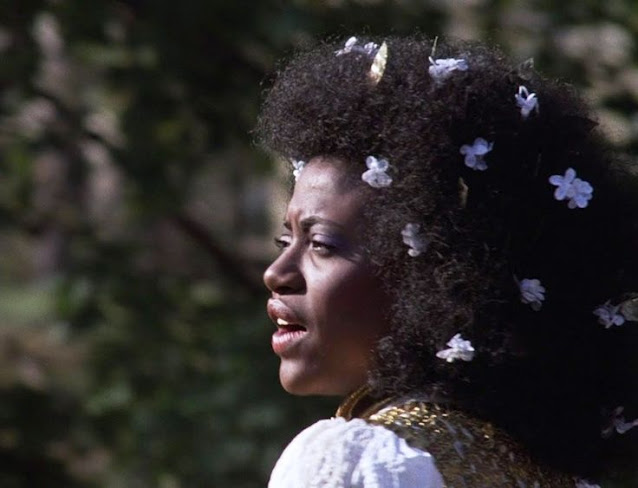Hair
Aside from a few things I've read, I can't speak too much of the original musical Hair, having merely been born during its original Broadway run. I don't know how much point-for-point the 1979 film adaptation, also called HAIR, deviates from it. I've read the criticisms: watered down, songs dropped or altered, main characters more weird than counter cultural. I haven't investigated those charges to any significant degree, but I have one of my own - for a story that is set in and all about the psychedelic '60s and its confrontations with clean cut America, it just feels so, '70s.
Mainly the musical arrangements. The orchestrations are bigger, with use of horns and strings. But it's that bass that makes every song ring of the time period in which it was recorded; the late 1970s. A lot of what is now called "yacht rock", with liberal doses of funk. The original tunes were reportedly longer, with a slower tempo. And while many of the costumes do resemble hippie garb, some outfits appear anachronistic, at least a few years too early. But I wasn't there, so what does my Generation X self know anyway?
What about the film's attitude? Is it an on fire middle finger to the Establishment, like some Robert Downey Sr. movie? Or does it reek of '70s malaise and apathy? A not-so-fond, not-so-rose-colored-glasses look back at the free love generation. A point of view that is older, wiser, less celebratory of a rootless lifestyle.
For director Milos Forman's movie, the central character of Claude (John Savage) is changed from a hippie to straight arrow from Oklahoma who's on his way to basic training in the Army. He makes a stop in New York City, spending a few eventful days with a group of long hair free spirits led by Berger (Treat Williams). They introduce him to grass and sing of the joys of living in the streets. The tribe also happens upon an upper class girl named Sheila (Beverly D'Angelo) in Central Park, eventually leading to their crashing a party at her parents' mansion. Maybe Claude and Sheila fancy each other. Maybe they both covet the hippie aesthetic, skinny dipping and all. But people do have to grow up sometime, right?
So yes, Michael Weller's adaptation has significant differences from the original play, evidently including the finale, which is quite powerful and effective in theme, if not in logistics (you'll be asking a lot of questions if you think about it too hard). The antiwar sentiment remains, and there is a conscience among the frivolity. Tribe member Hud (Dorsey Wright) is confronted by his abandoned fiancee, with small child in tow. She's none too pleased to see that hippie chick Jeannie (Annie Golden) is pregnant, possibly with his child, prompting the heartrending song "Easy to Be Hard". It is one of the most affecting moments in the film.
HAIR is also about sexuality (and race), with plenty to absorb from the title song, "Sodomy", and "White Boys" and "Black Boys" sung respectively by Nell Carter and Ellen Foley, interspersed quite amusingly with scenes at the draft board. The humor of the scenario is fleshed out here quite vividly, and Forman's direction is nothing short of dazzling. For the entire movie, actually. HAIR is highly recommended because of how cinematically exciting it is. The energy of the dancers, choreographed by Twyla Tharp, combine seamlessly with the actors' invested performances and Miroslav Ondricek's sharp photography. This is a full scale affair, with large crowd scenes, offbeat dream sequences, drug trips. At times it feels a bit too much, too kitchen sink, but as it overwhelms it also energizes. In an admittedly 1970s kinda way. The Age of Aquarius with a crack session band.
But maybe John Savage shouldn't ever sing again. He looked and sounded as if in pain. Mercifully, his croaking has less screen time than that of Pierce Brosnan in MOMMA MIA!



Comments